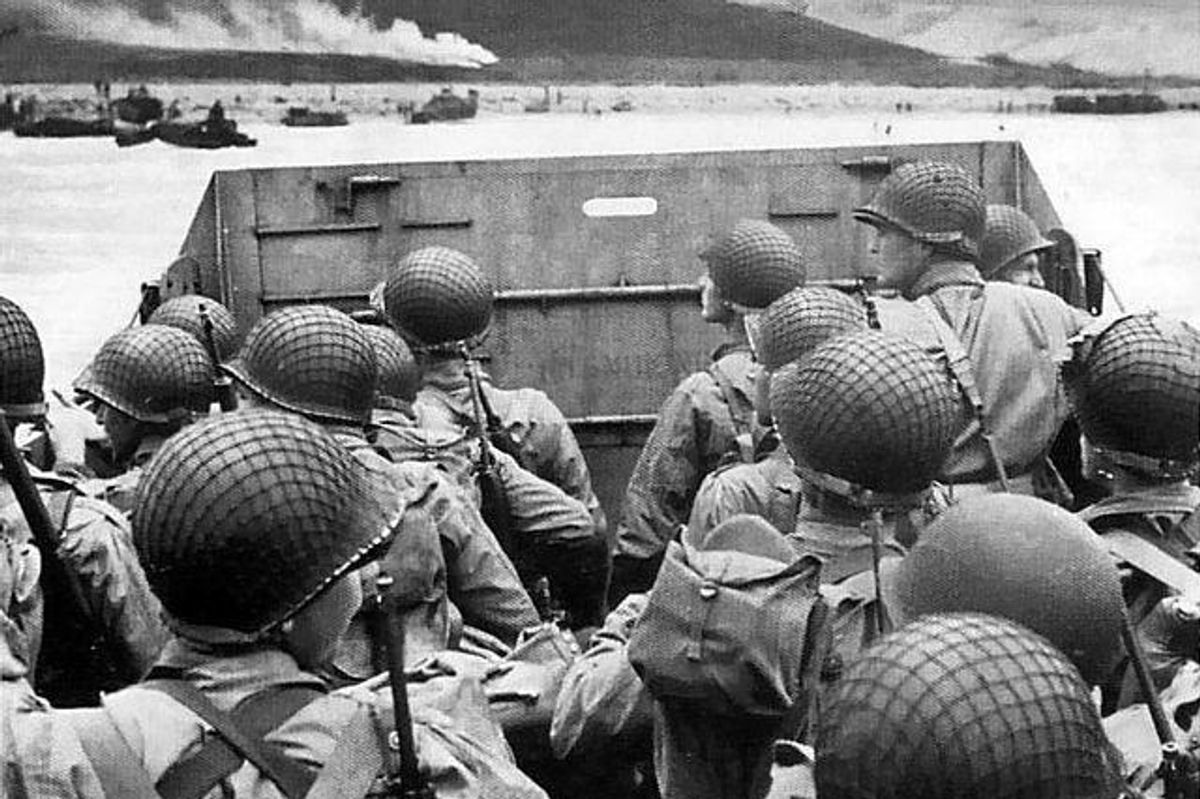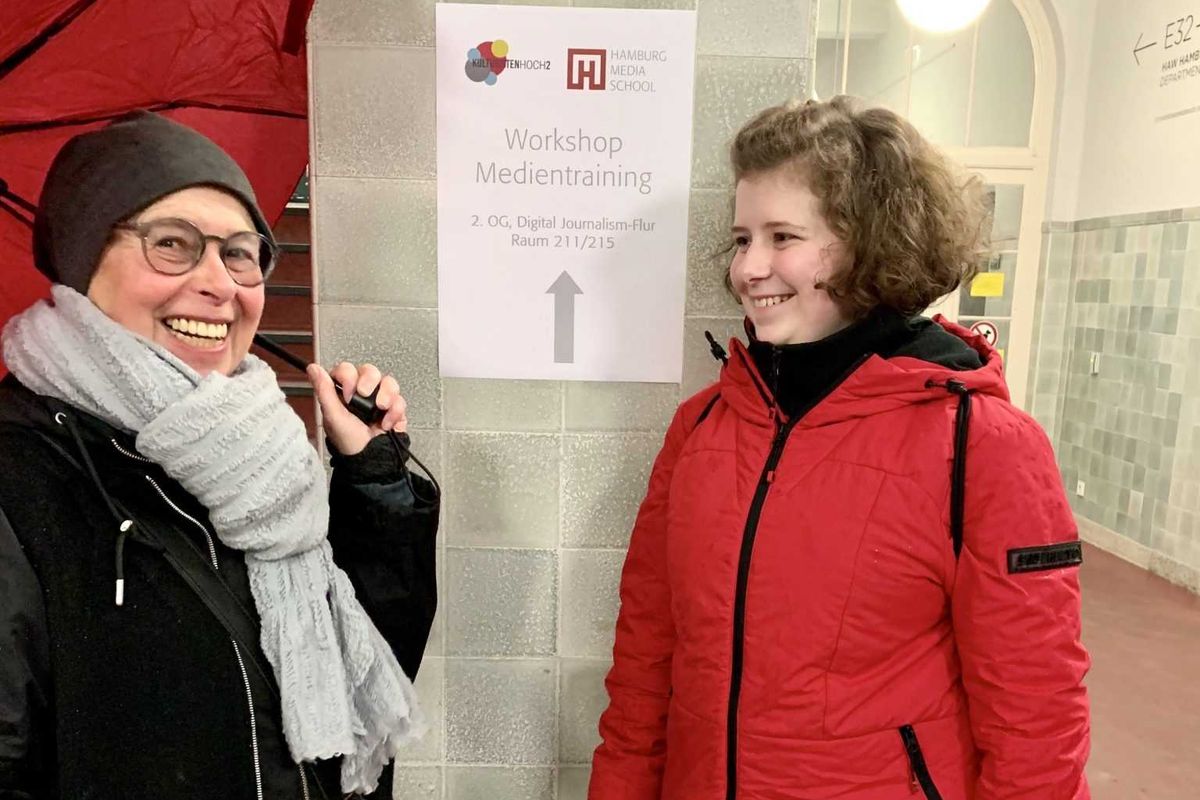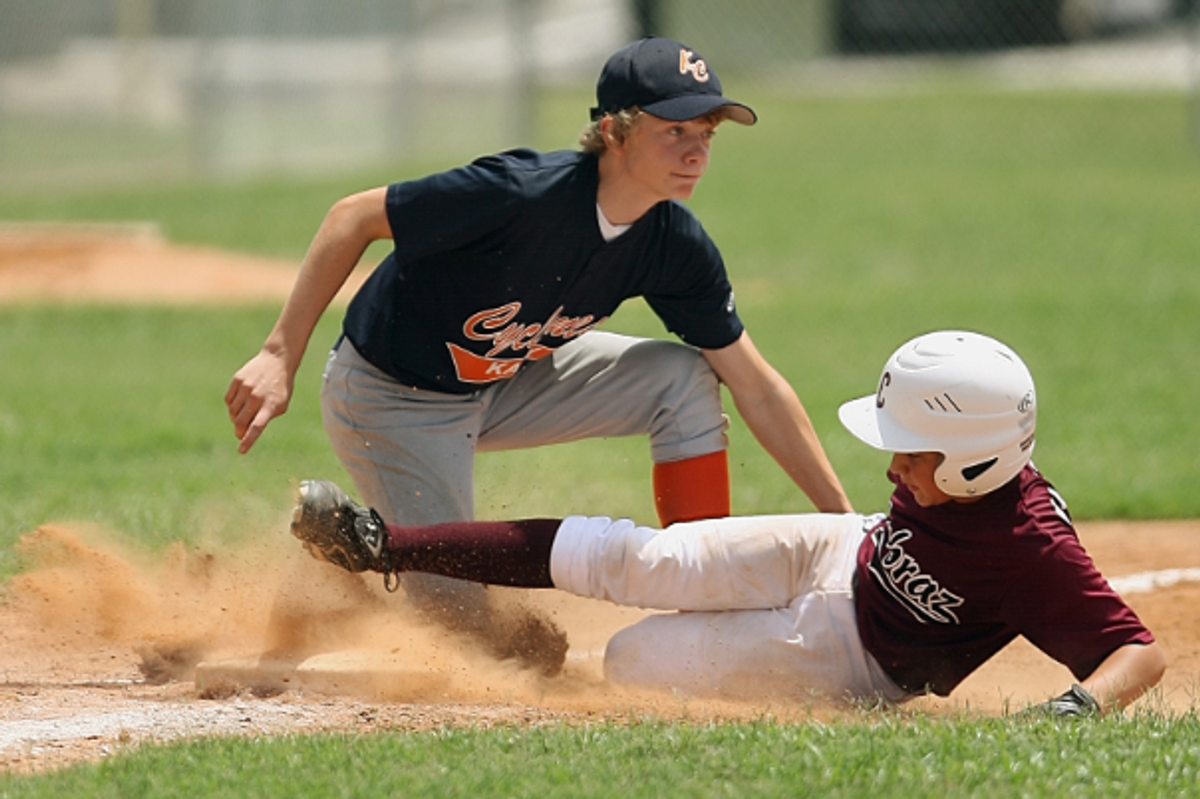Best buddies separated during WWII reunite 78 later, proving that true friendship is forever
'It was like we had always been family.'

World War II, Operation Overlord, Omaha Beach, 1944.
This summer, after 78 years apart, my grandfather, World War II veteran Jack Gutman, got to reunite with his best friend from the war, Jerry Ackerman. They saw each other for the first time since the 1940s and spent two days laughing, joking, catching up and being honored by the Marine Corps at Camp Pendleton in Oceanside, California.
Finding an old friend is always an occasion to celebrate, but the story of how this reunion came to be feels like true kismet. Not only were two buddies reunited, it also brought closure to two WWII veterans during some of the tougher years of their lives, while also uniting two families, now forever changed.
Take a moment and think back to what you were doing at the age of 17.
Depending on your generation, the activities might look a bit different. Baby boomers might have been sipping a milkshake at the local diner. Gen Xers might have been angstily listening to The Smiths or the Sex Pistols. If you’re a Gen Y millennial like me, you were maybe shopping for cheap jewelry at Claire’s Accessories at the mall. Regardless of what you were up to as a teenager, you probably weren’t doing what my grandfather was doing at age 17—fighting as a Navy Corpsman during the invasion of Normandy.
My Grandpa Jack was born in 1925 and grew up in New York City. When Uncle Sam called, he lied about his age and enlisted in the Navy. He wanted to serve his country, but had no idea the horrors of war he would witness during the Normandy Invasion and the invasion at Okinawa.
When I was growing up, my grandfather didn’t talk about the war. For years he struggled with PTSD and all of the various coping mechanisms people experiment with to get out of pain. It almost tore his life apart, but with the love and support of our family, he made his first steps toward healing.
With the help of Dylan Bender, a talented therapist with the Veterans Association, a decade of EMDR and CBT, my grandfather can now talk about his experience during the war. He even wrote a book about it.

via Erin Shaw
He’s been interviewed on television, at the WWII Museum in New Orleans and he speaks to groups of students regularly. He even got to travel to Normandy, France for the 75th anniversary of D-Day as part of a documentary. You could say his journey to heal the wounds of war was pretty complete, but there has always been one bit of closure he was never able to get.
A friend he always wondered about.
In between the invasion of Normandy and his time in Okinawa, my Grandpa Jack returned to Camp Pendleton for training and that is where he met Jerry Ackerman.
“I was assigned to Oceanside, California and that’s where I met Jack, and we became instant friends,” said Jerry. “He was the most jovial, fun-loving guy ever. Always smiling and always happy.”
The feeling was mutual. “Jerry was one of my best friends after Normandy. I knew him when I got transferred over to Oceanside to the Beach Battalion. We hit it off, I guess from both being New Yorkers maybe. One thing I didn’t like about Jerry was that he was better looking than me,” Grandpa Jack joked. “We bonded together, and it was one of the greatest times I’ve ever had.”
The camaraderie of this new friendship gave my grandpa a respite from all of the atrocities he had experienced while trying to patch up dying soldiers on the beach in France. In his friendship with Jerry and another Navyman, Joe Gagliardi (who we haven’t been able to find), Grandpa Jack found solace and humanity … the very things he wanted to fight to protect when he enlisted. Unfortunately, the war hadn’t ended yet and when Grandpa Jack was sent to Japan, he, Joe and Jerry lost touch.
“We never got a chance to say goodbye when we got to Pearl Harbor,” said Grandpa Jack. “I got transferred to another ship. So all these years I often wondered about them.”
Apparently, Jerry had been wondering about my grandfather as well because one day in early 2021, out of nowhere, a silly little song my grandpa had once taught him popped into his head. It was a happy memory that Jerry desperately needed. His wife Barbara was in the hospital in New York for a health issue, and he was very down after having visited her.
“My parents have been married for 70 years and when something happens to one of them, like my mother’s hospitalization, it really affects the other,” said Peter Ackerman, Jerry’s son. “My father and I finished visiting her and went to a restaurant. It was there, toward the end of our meal, when a song randomly popped into his head that he hadn’t sung since his Navy days during WWII. It was a song, he said, that was taught to him by his good buddy, Jack Gutman. As my father lamented out loud about having never been able to track his friend down, using my phone and good ol' Google, I found someone matching Jack’s description and Navy background. When my father realized I was actually calling someone named Jack Gutman his eyes were as wide as pies!”
Meanwhile in California, Grandpa Jack was having a tough time himself. His life had changed drastically when the pandemic hit. He, like everyone else, was feeling isolated, and while younger generations were turning to their devices, social media and Zoom, older generations without as much tech knowledge were feeling even lonelier. At the time, Grandpa Jack had just gotten over the coronavirus and my grandma had gotten COVID-19 pneumonia and was still slowly recovering. They were quarantined at home and Grandpa Jack was experiencing some pretty tough bouts of depression.
“I was depressed and really down, sitting in my office one afternoon and I was just thinking that life was a lot of crap,” Grandpa Jack said. “I usually try to stay pretty positive, but this day was tough. In my lowest moment of depression the phone rang, and it turned out to be a guy named Peter. He said to me, ‘Are you Jack Gutman?’ and I said, ‘Yeah…’ and he said, ‘Were you stationed in Oceanside, California?’ and I said, ‘I sure was, yeah.’ And he said, ‘Did you ever know a Jerry Ackerman?’ and I said, ‘He was my best friend. I’ve got his picture up on my wall,’ and he said, ‘He’s my father and he’s sitting right here, and he’s been looking for you for about 77 years.’ And I tell you, the tears flowed. It was just the thing I needed so badly. I could not believe it.”
The timing of this call couldn’t have been better, and it was so random that it felt kind of like fate to our families.
“I will take to my grave the look of pure joy on my father’s face when he and Jack spoke for the first time. They talked for a half hour and vowed to keep in touch,” said Peter.
For Grandpa Jack, it was an emotional and life-affirming call that helped give his days some renewed vigor. “Hearing his voice and realizing that there’s a man that for 77 years has been wondering about me, it touched my heart,” said Grandpa Jack.
When the call ended, Peter tells me that his father was beyond grateful to have reconnected with Jack. “He was almost in shock, and happier than I had seen him in a very long time,” he said. “Sitting there in that restaurant, listening to my father talking, laughing and reminiscing with Jack, I felt so happy for both of them, and a deep sense of satisfaction in having helped sew that stitch. It was as if a circle was completed. It was a highlight of my life, and I believe one of the great highlights of my father’s life as well.”
These two men could have connected at any point during the last 70-plus years but for some reason it didn’t happen until a moment when they both needed to hear from each other. Some might call it coincidence, some might call it fate, but it changed both men’s lives.
“My dad’s life had changed so much because of the pandemic,” said my mom, Paula Shaw. “He couldn’t be out with his friends and doing his speaking engagements. So when Jerry’s call came through, dad’s whole life picked up again and turned around. It gave him hope and it gave him a sense that he mattered because this man, 77 years later, remembered him and sought him out. So it was a real turning point for dad.”
You’d think that just having that phone call would have been a highlight of these two men’s twilight years, but there was more coming.
A reunion with military honors.
Jack and Jerry kept in touch over the phone for the next year, but they were still yet to see each other face to face. My mom Paula had gotten to befriend Peter and together they were able to plan a time for Grandpa Jack and Jerry to meet, with a few family members in tow.
It turned out the Ackermans were planning to be in San Diego for a wedding in June of this year and with my own family based in Southern California it would be the perfect time for a reunion.
But before that, they had a face-to-face chat with my mom when she interviewed them for her podcast, Change it Up Radio. I asked my mom what it was like to facilitate the first face-to-face interaction between Jack and Jerry on her podcast over Zoom, and she described it as life-changing.
“When I got the idea to have them see each other for the first time on the Zoom screen I had no idea how really wonderful and moving and almost life-changing it was going to be. When they laid eyes on each other for the first time, dad started to cry, and Jerry just got the sweetest, softest expression on his face. He was so touched that dad was so happy to be able to see him.”
With their podcast interview in the can and a first face-to-face reunion over Zoom a success, it was time to get together in person in San Diego.
World War II veterans are harder and harder to connect with these days. According to Forbes, we lose approximately 234 of them each day. Having two best friends from the war still alive, healthy and with all their mental faculties intact is rare, so time was of the essence to get these two together for some quality time.
Unbeknown to Jerry and Grandpa Jack, my mom had arranged a visit to Camp Pendleton for them as well as for CBS News to come capture their reunion. Our family captured some of our own amateur footage, which is hard to watch without crying.
So what was it like to witness the reunion in person? “It was just lovely to see,” said Mary Jo Gutman, my grandma. “To think about the time that had passed and now they were able to see each other and touch each other, it was just a beautiful moment. Everybody that was there was having the same experience. Some people teared up and some were just in a state of shock, but a happy state. We were all just happy for them both.”
My uncle, Craig Gutman, traveled with Grandpa Jack back to Normandy in 2019 and was with him when he visited the beaches and military cemetery there. He says while that was tough, this moment of closure was nothing but joyful. “It was just so nice for them to see each other again and to be back with each other,” he said. “Even after just a few minutes they were the same 19-year-old guys, BS-ing with each other and telling jokes. To just see the joy in both of them, being able to find an old friend after so many years that they probably figured was either dead or gone and would never be seen again. It was just great.”
My aunt Marilyn Gutman describes their reunion as a full-circle moment. “When they met, it was like they had always been together, starting in on the jokes, the laughter, the camaraderie that had brought them together initially. I felt their lives had just come full circle. I felt a completeness for them, a closure of the wounds of war.”
Over the course of the next couple of days, the families got to spend time together and although I wasn’t able to be there myself, everyone who was there described loving each other instantly just like Jack and Jerry had upon meeting.
“It was like we had always been family,” my mom Paula said. “I get a little teary just thinking about it. It was like we’d known each other for years. We laughed, we had meals together, we chatted up a storm. It was crazy. It was like whatever that energy was that brought dad and Jerry together had been passed onto the families. All the family members felt that same connection.”
For my Grandpa Jack, getting to reunite with his best friend from the war was the last bit of closure he has needed during his healing journey with PTSD. It has reminded him that love is the most important thing we can give to others and that we never know how we touch someone’s life just by being their friend.
“Jack struck me as the happiest guy in the whole world,” Jerry said. “I never ever knew what he went through in Normandy. I’m very delighted to know that at least I was a part of helping Jack rehabilitate himself. I’m very happy about that. Our reunion is something I will never forget.”
Grandpa Jack told me that he spent so long working to get over post-traumatic stress but not knowing what happened to Jerry was like a wound still left open. Finding out what had happened to him gave him closure, but being able to see each other and connect was a moment he’ll never forget. “It really fulfilled a closure for me. It was just amazing.”
“I feel like for both of them there was this unfinished chapter,” said my mom, Paula. “There was so much love between these two men and the war didn’t kill it.”
Perhaps Virgil said it best when he said, “Amor vincit omnia.” Love conquers all.
- New bill would restore benefits to veterans discharged for being LGBT as far back as World War II ›
- U.S. veterans return to Normandy to mark the 78th anniversary of D ... ›
- WWII vet who escaped Nazi captors finally gets Purple Heart ... ›
- A 92-year-old World War II fighter pilot flies her plane for the first time in 70 years. ›
- Meet Elaine Harmon, a WWII veteran with a unique dying wish. ›
- WWI vets got the short end of the stick in the Great Depression. This was their answer. ›
- A 92-year-old World War II fighter pilot flies her plane for the first time in 70 years. - Upworthy ›
- Woman reunites with family 51 after her kidnapping - Upworthy ›
- Foster homes for senior veterans is rapidly growing across America - Upworthy ›
- Progressive Insurance® donated 96 vehicles to veterans and their families as part of its ongoing commitment to driving progress on the road ›
- Women who've been friends for 75 years share key to friendship - Upworthy ›
- Woman finds her grandpa's resume from 1946 and it's a fascinating time capsule - Upworthy ›
- Military mom welcomes son's battle buddy into family in emotional video - Upworthy ›
- WW2 lovers were separated after a blind date, but a letter with a map saved them - Upworthy ›
- 107-year-old WWII veteran gets his diploma 93 years after dropping out of high school - Upworthy ›
- Grandmas giggling over seatbelt shenanigans is pure delight - Upworthy ›



 A UPS truck with package deliveries.Image via Wikipedia
A UPS truck with package deliveries.Image via Wikipedia
 Cher was the biggest phenomenon on the planet for the better part of the '70s and '80s.Casblanca Records/
Cher was the biggest phenomenon on the planet for the better part of the '70s and '80s.Casblanca Records/

 A high school volunteer with her senior "tandem."
A high school volunteer with her senior "tandem."  KH2 makes leaving the house more accessible to senior citizens.
KH2 makes leaving the house more accessible to senior citizens.  Many "culture buddies" stay in contact after the program ends.
Many "culture buddies" stay in contact after the program ends.  KH2 provides students with excellent life skills and lasting connections.
KH2 provides students with excellent life skills and lasting connections. 
 Parents posing with their young kids on a basketball court. via
Parents posing with their young kids on a basketball court. via